OK, I’m not sure why, but this feels like a bit of a confession. Perhaps more accurately, an admission to myself. I offer it in hope of inviting a reframing of documenting and harvesting. So that I can settle down a bit in my own practice. And as a question about harvesting that can help all of us who do it to improve our craft, to center our craft.
Despite my very strong desire to harvest out oodles of insights that happen on a daily basis — all of which are extremely valuable in some way — I can’t keep up. Some are from work events. Some are from books or articles. Many are from conversations with colleages and friends. Many are from work meetings. Some are from simple times of quietness. I don’t feel particularly unique in this way. Most people I know are very busy, living life, in the doing, and are very full. Few of us capture all of what comes to us.
However, I often feel disappointment in my not harvesting more. Like a huge gift just got overlooked. In participatory leadership, it can be the difference between “that was a good conversation, now lets get back to our real work” and “that was a great meeting that now launches clear and sustainable action steps.”
So, as I was thinking yesterday about the many things I wanted to harvest — many of which are now old dusty post-it notes and feeling like a burdon piled in a growing stack — I found myself asking how I might think differently about harvesting? What would free me from the tyranny of volume into the aliveness of periodic noticing?
A translation of this question could be what other choices do we have than creating laborious, thick, text filled reports that few read? Massive effort. Less than massive impact. What other ways might help capture the energy and power of the whole without needing a detailed complete history of all that happened?
The insight for me was about documenting. I don’t have the time to document, as in record the full and comprehensive history, of all of the work that I am in or of all the life that I am in. There is a part of me that wants to make the time to do so, and believes that I can — who needs sleep anyway. But for me, I know inside this is unnecessary and quite draining. What I do want is to choose one or two…artifacts…that give me / us access to the energetic whole of the comprehensive experience.
“Access to the energetic whole” is I suppose another form of the old adage, “a picture is worth a thousand words.” That image of my son Isaac holding his first fish that he caught brings me energetically to the whole of the experience — the lake, the peanut butter sandwiches we ate, the breeze coming off of the lake.
I know that many of us are in a deep practice of creating artifacts, the pictures. Sometimes as words, or stories, or pictures, or images, or videos, or phrases, or music, etc. I think the world view underneath this is what is calling to me now. A holistic view that I practise is that not only is the whole greater than the sum of the parts, but also, the whole is available in any of the parts. Like I’m told the DNA for an entire body is available in each of the cells. From this view, the work of harvesting shifts from an obsession or obligation to get all of it in its volume, to the freedom of following one or two sparks that provide gateway into the resonance, the energy of the whole experience. Gateway to the resonance is the hit for me.
OK, I wonder what this view might free me / us to do in the practice of harvesting?
My first clarity is that in writing some on this blog, my resonance shifts into feeling a harvest of the whole — which in this case may be more about a stream of consciousness and learning and creation rather than the log of all things. The resonance as the center of the harvest is what I sense is most lasting. And I have this sense that many of us are coming to see and language more of this. In my hosting settings, I want people to remember and reactivate the feeling of clarity and community that they felt in being together, and organize from that.
The part as gateway to the whole — that honors the multiple ways of getting to what matters and it does so through simplicity. That’s a practice I want to spend more time with.
Another post on four levels of harvest from some work with The Center for Human Development. See the very end.



